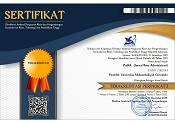Effectiveness Program for Women Head of Family (PEKKA) In Sukabumi City
Abstract
Keywords
Full Text:
PDFReferences
Agustino, L. (2017). Dasar-Dasar Kebijakan Publik. Bandung: Alfabet.
Creswell, JW (2016). Desain Penelitian: Pendekatan Metode Kualitatif, Kuantitatif, dan Campuran. SAGE.
Jones, CO (1996). Pengantar Kebijakan Publik (Public Policy). Terjemahan. Rick Ismanto. Penerbit PT Raja Grafindo Persada.
Lexy J.Moleong, DMA (2019). Metodologi Penelitian Kualitatif (Edisi Revisi). PT. Pemuda Rosda Karya. https://doi.org/10.1016/j.carbpol.2013.02.055
Miles, MB, & Huberman, AM (1994). Analisis Data Kualitatif Edisi Kedua. Publikasi SAGE. Dalam Analisis Data Kualitatif: Buku Sumber yang Diperluas.
Mukti, LM (2020). Pemberdayaan Perempuan Kepala Keluarga. media Indonesia. https://mediaindonesia.com/opini/356355/pembedayaan-perempuan-head-family
Natasya, SAYA (2017). Efektivitas program Pendukung Kepemimpinan Perempuan PEKKA dalam meningkatkan kepemimpinan dan kemampuan organisasi perempuan kepala keluarga. Universitas Katolik Parahyangan.
Putri, O.N, & Darwis, RS (2015). Pemberdayaan Perempuan Kepala Keluarga (Pekka) Melalui Pelatihan Kewirausahaan. Prosiding Penelitian dan Pengabdian kepada Masyarakat, 2 (2).
Shiyami, SL (2015). Efektivitas Program Perempuan Kepala Keluarga (Pekka) oleh Badan Pemberdayaan Perempuan Perlindungan Anak dan Keluarga Berencana (Bp3akb) Provinsi Jawa Barat di Kota Bandung. Universitas Padjadjaran.
Subagyo, AW (2000). Efektivitas Program Penanggulangan Kemiskinan dalam Pemberdayaan Masyarakat Perdesaan. UGM.
Sugiyono. (2018). Metode Penelitian Kuantitatif, Kualitatif, dan Litbang. Pada tanggal 26.
Susanti, E. (2013). Tingkat Pemberdayaan Perempuan Kepala Keluarga (Kasus Program Pekka di Desa Dayah Tanoh, Kecamatan Mutiara Timur, Kabupaten Pidie, Provinsi Aceh). Jurnal Agripep, 14 (2).
Susianda, T. (2014). Peran Program Pemberdayaan Perempuan (PEKKA) dalam meningkatkan kesejahteraan janda di Kecamatan Tangantangan Kabupaten Aceh Barat Daya. Universitas Teuku Umar.
Tuvaona, FXM (2017). Evaluasi program pemberdayaan perempuan kepala keluarga studi kasus kelompok PEKKA Mawar Kecamatan Bandung Kulon. Universitas Katolik Parahyangan.
Article metrics
Refbacks
- There are currently no refbacks.
Copyright (c) 2023 Publik (Jurnal Ilmu Administrasi)

This work is licensed under a Creative Commons Attribution-ShareAlike 4.0 International License.

Publik (Jurnal Ilmu Administrasi) is licensed under a Creative Commons Attribution-ShareAlike 4.0 International License.










